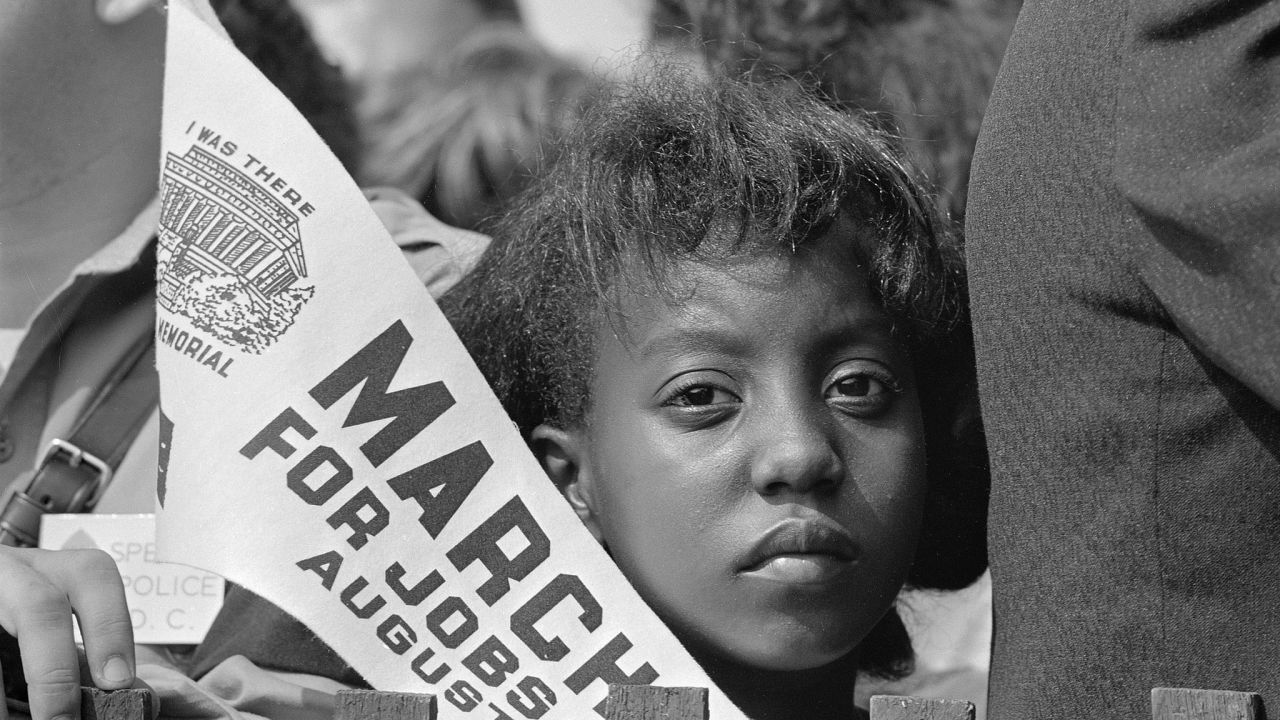
Young Woman at the March on Washington for Jobs and Freedom, Aug. 28, 1963. (Photo by Archives Foundation/ flickr CC 2.0)
This post originally appeared at Talk Poverty.
Late last month, the White House invited leaders from the Historically Black Colleges and Universities (HBCUs) to participate in a listening session and to meet with President Trump, Vice President Pence and Secretary of Education Betsy DeVos. The group talked about improving education, school infrastructure, collaborations with private industry and jobs for HBCU students.
Days after the meeting, Morehouse College President John Wilson described its tone as “troubling.” He noted that President Trump’s promises to “do more for HBCUs than any other president has done before” were impossible to measure, and Secretary DeVos’ reference to HBCUs as “pioneers of school choice” showed willful ignorance of Jim Crow and segregation.
It was just the latest insult in a month that began with Trump using the legacy of Martin Luther King Jr. to attack the media — rather than mention any of King’s accomplishments — saying:
Last month, we celebrated the life of Reverend Martin Luther King Jr., whose incredible example is unique in American history. You read all about Dr. Martin Luther King a week ago when somebody said I took the statue out of my office. It turned out that that was fake news. Fake news. […] I think it was a disgrace, but that’s the way the press is. Very unfortunate.
These examples highlight a persistent moral awkwardness afflicting the Trump administration. The yawning gap between President Trump and the leader he was almost honoring (who was a graduate of an Atlanta HBCU, Morehouse College), doesn’t just make the two men seem at odds. It calls for a reassessment of the road that lies ahead.
In 1967, King delivered a powerful speech calling racism, economic exploitation and militarism “triple evils.” He said a society where machines, profit motives and property rights are considered more important than people required a revolutionary shift in values — one that questioned past and present policies, and looked glaringly at the contrasts between poverty and wealth.
During his campaign for the US presidency, Donald Trump stood on the platform of the “triple evils” that King condemned. Trump espoused populist contempt for traditional political elites, promoted authoritarian views of crime and justice and launched xenophobic, racist and misogynistic attacks that the media amplified. Trump’s statements are not pithy one-offs — they are rank hallmarks of his deeply held views.
As a private businessman, Trump was responsible for a laundry list of highly public positions that are both racist and dangerous. In 1973, the Department of Justice filed a civil rights case against Trump charging him with discriminating against African-Americans who applied to rent apartments in buildings Trump owned. In 1989, Trump spent $85,000 for a full-page ad calling for “murderers and muggers to be forced to suffer and to be executed when they kill” after five black and Hispanic teenagers were accused of raping and beating a white woman in Central Park. Though all five men they were proven innocent, Trump has never apologized and has maintained that the five men must be guilty. Then in 1991, Trump’s Plaza casino and hotel was fined $200,000 by the New Jersey Casino Control Commission because the casino’s manager regularly removed African-American card dealers at the request of certain affluent gamblers, and ordered all black staff off the floor when Trump came into the casino.
Now, after just one month in office, we are witnessing the policy implications of a demagogue who becomes commander-in-chief.
Trump has already attempted to sever health care access for millions of Americans, cleared the path for the Dakota Access Pipeline, ordered the construction of a border wall with Mexico, vowed to punish “sanctuary cities,” issued two executive orders to temporarily ban travel from several majority-Muslim countries and issued three other executive orders granting more authority to local and federal police. These early policies are reflective of the profit-driven, racist, militaristic ideals that characterize oppression.
King would not have been complicit or sanguine about this.
In 1961, King declined an invitation to John F. Kennedy’s inauguration, even though Kennedy had lobbied for King’s release from an Atlanta jail months prior. King’s self-imposed absence from Kennedy’s inauguration was strategic — he was unwilling to let Kennedy (or anyone else) paternalistically set or dictate the tone and timetable for civil rights.
Many so-called leaders, who have rushed to sit at the table Trump has laid, could take a lesson from Dr. King.
King used his absence to help nudge Kennedy to take a firmer stance on civil rights. Weeks after the inauguration, King wrote to Kennedy outlining how the new president could use the power of his office to end racial discrimination. King’s stance is critical for us as women, men, workers, mothers, fathers and LGBTQ people reckoning with our lives in Trumpland.
By example, King showed us what it looks like to preach, march, teach, sit-in and push the media to tell the truth.
King’s dream did not envision accepting status quo militarism, racism, violence or economic exploitation. King’s dream did not envision handing out socks, food and toiletries as the endgame. King’s dream showed us what is possible, if we forge ahead with mutuality, community, respect and love.
King’s dream gave us a road map through Trumpland.




